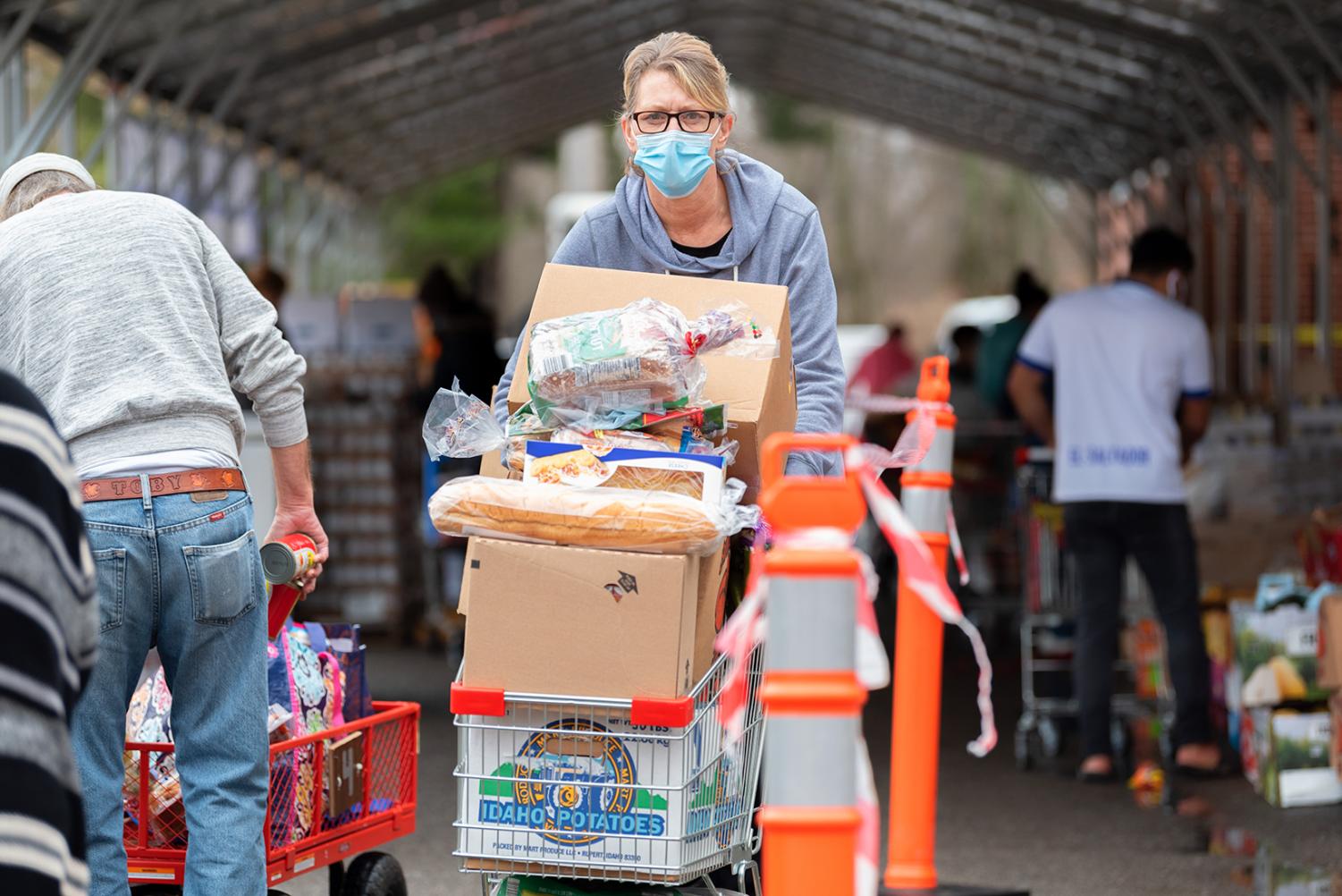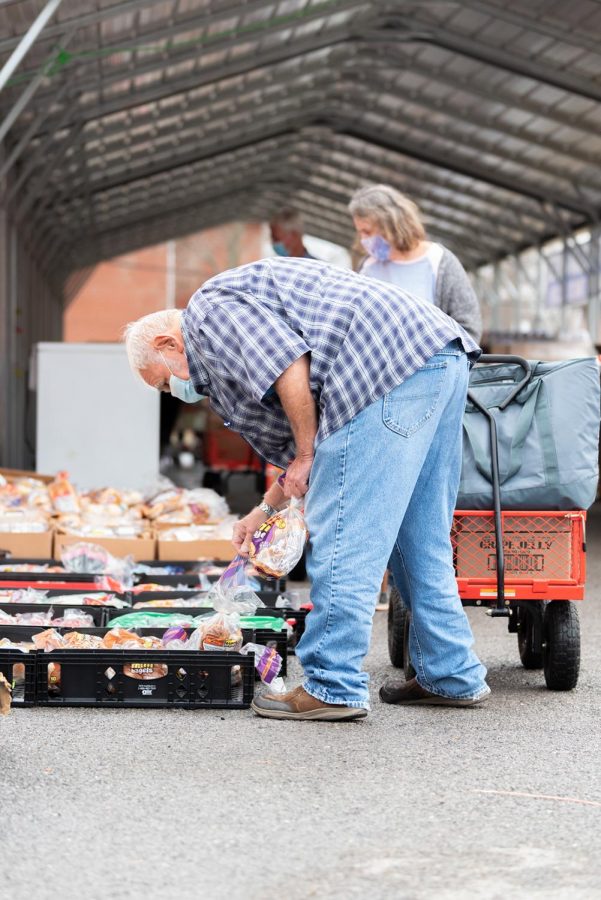Illinois Food Banks cope with unprecedented demand due to COVID-19
March 8, 2021
Steve Ericson, the executive director of Feeding Illinois, said he’s never seen any disaster that comes close to having the same devastating impact COVID-19 has had on the communities he serves.
Ericson has been involved in food banking for almost 30 years, getting his start around the time of the Great Flood of 1993 which devastated communities along the Mississippi River valley “from Canada to the Gulf” and he said even that crisis didn’t come close to impact of the pandemic.
“We’ve never seen anything like this, and, you know, it basically shut down supply chains, shut down, obviously, all businesses everywhere short term,” Ericson said.
Advertisement
At the beginning of the pandemic calls for services, like assistance applying for Supplemental Nutrition Assistance Program or SNAP, and requests for food skyrocketed.
“Initially, we were seeing 500% increases,” Ericson said. “It was so off the charts, we didn’t, I’m not sure we were even capturing them all because it was just phone message after phone message.”
The demand was driven primarily by people who had never previously needed any kind of emergency food service and didn’t have any idea of how to navigate the system, Ericson said.
The calls have since plateaued and come back down but demand at every food bank remains high.
The St. Louis Area Food Bank, which also services southwestern Illinois, distributed nearly 35 million meals from the middle of March to the end of December in 2019 according to Advocacy Manager Teresa Schryver .
In 2020 that number rose to over 48 million meals, a 38.6% increase.
Greater Chicago Food Depository wasn’t able to provide figures for the 2020 calendar year, but in their fiscal year, which ran from July of 2019 to June of 2020 they distributed 77.5 million meals, a 24 percent increase compared to the previous fiscal year according to Associate Director of Communications Greg Trotter.
Advertisement*
The Central Illinois Food Bank, based in Springfield, distributed over 8 million meals in 2019, and increased distribution to nearly 10 million meals in 2020, a 22% increase according to Executive Director Pam Molitoris.
Tri-state food bank, which is based in Indiana and services 16 southeastern Illinois counties, saw a 6% increase in meals distributed in its Illinois counties from 2019 to 2020, according to Executive Director Glenn Roberts.
“Like many other food banks, I’m sure, we saw a dramatic increase in need when the pandemic hit, and we’re continuing to serve a higher than normal level of people, considerably higher,” Trotter said.
The increases in food bank distribution are monumental, but they don’t capture the full distribution effort or demand for food around the state because the food banks only track what comes through their system.
Programs like the Farmers to Families food boxes, and food drives that don’t involve the food bank can go largely unaccounted for in food distribution data though they provided tens of millions, maybe hundreds of millions, of pounds of food throughout the state Ericson said.
“A lot of those distributions are totally off our radar,” Ericson said.
The silver lining of the pandemic is the new relationships which the food banks, pantries, and volunteers have developed to cope with the massive increase in food insecurity Trotter said.
“People and organizations have come together in ways that just weren’t happening,” Trotter said. “Organizations that are, like, entrenched in the neighborhood. They are deeply respected and trusted, they know the families that are coming in the doors.”
One example Trotter gave was a pantry in the Bronzeville neighborhood in Chicago at Chosen Tabernacle Ministries which was on the verge of closing down when a team from the University of Chicago stepped up to assist with food distribution.
Communities in southern Illinois also faced volunteer crises when older members couldn’t make themselves available due to the health risk posed by COVID-19.
Megan Austin, director of the Murphysboro Food Pantry, said in a November interview that the pantry had been operating through the pandemic with basically half the volunteers it would normally have, or less, because older members were at risk.
Kendra Mitchell, the serve director at Little Chapel Church in Harrisburg, Illinois said in a February interview that the church had an influx of new, often younger, volunteers many of whom weren’t even church goers that filled in potential gaps and they never ran short on people as a result.
“Those guys are heroes in my opinion,” Ericson said.
Staff reporter Jason Flynn can be reached at jflynn@dailyegyptian.com, by phone at 872-222-7821 or on Twitter at @dejasonflynn. To stay up to date with all your southern Illinois news, follow the Daily Egyptian on Facebook and Twitter.
Advertisement





Mark Czmyrid • Mar 8, 2021 at 11:52 am
So many so many so many people are hurting I tell you what and sometimes the politicians the billionaire politicians in the millionaire politicians they don’t get it you know people making $80,000 a year or two family household making both $80,000 to Total 160,000 they don’t get it you know far and few between individuals make I mean there’s not a lot of very low percentage of people making 80 grand a year I mean even if you look in sick take for instance Jackson county or Williamson county Perry county the lower you know can you say a person is really making 80,000 I mean how many people do you know actually made $80,000 a year just one person you know most people are making you know they’re either on minimum wage jobs you know a lot needs to be done and there needs to be more done for the the elderly disabled person the person that’s 45 years and up who worked other life and sadly you know nobody wants to go on disability but a lot has to get done it’s time that people come together this is where we can utilize farmers markets and programs and you know we can really do a lot to help the American Farmer and specially in Illinois and I’m calling upon the governor and I’m calling upon the members of the Congressional delegation as well as the local legislatures be it representative state representatives of state senators to pull together in a bipartisan way to pull together and get this done because hunger and America no kid in the United States of America no kid like the lake Kenny gray used to say Kenneth j gray used to say and I remember those of you that may remember me from the 84 Paul Simon for United States Senate campaign I worked for Ronald Reagan that year his reelection and I’ll never forget I was out of campaign stop right there at the freeform area on the campus of SIU Carbondale and I gave a speech on behalf of Paul Simon and I’ve got a picture there’s a picture look it up at the daily Egyptian you’ll see me with Simon and Kenny gray and trying to think the other I think it was Andy late there was the was the student body president at the time and I’ll never forget Kenneth Jay Gray congressman gray was returning the Congress he said I will send no I will never send a dollar to Cairo Egypt until I send two dollars go to Carroll Illinois but anyway I just want to let you guys know be proud to be a Saluki I am and be proud for people and pay it forward you know times are tough I’m about ready to put my political hat on and I’m about ready to find some beautiful women because all women are beautiful and I’m timed I’m about to get them elected because you know what we need to stop playing this this Penny battle between members of Congress you know I’m better than you because I have this color flag or that color flag or I represent this this particular interest well let me tell you something when you’re elected official you represent the people you don’t represent your party and you don’t represent your flag of whatever group you know it’s time to put kids in Illinois